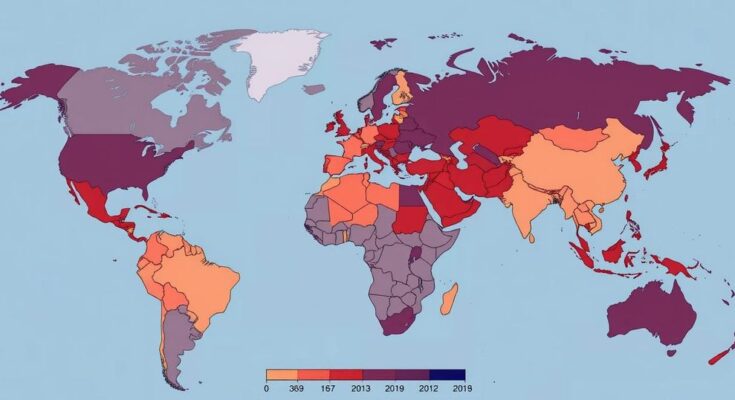In 2024, voters worldwide rejected incumbents, prompting political upheaval across 70 countries. Anti-government sentiments surged due to post-pandemic discontent, inflation, and global instability, leading to significant electoral losses for established parties, particularly in nations such as India and the UK, while the rise of far-right movements presented new challenges for democracy.
In the tumultuous year of 2024, voters across approximately 70 nations vociferously expressed their dissatisfaction with existing leadership. This surge of anti-incumbent sentiment was evident from global powerhouses such as the United States and India to smaller nations in Africa and beyond. Prominent factors contributing to this environment included economic turmoil stemming from the COVID-19 pandemic, persistent inflation due to geopolitical tensions, and general discontentment with the status quo. Political upheavals characterized the electoral landscape, as governments that had long held office were forcibly ousted or marginalized.
In South Africa, the long-dominant ANC party faced a significant blow, losing power in provincial elections and having to form coalitions with other parties. Furthermore, Prime Minister Narendra Modi’s Bharatiya Janata Party lost its parliamentary majority in India, signaling a shift in voter priorities towards nascent opposition coalitions amid economic recovery efforts. Similar trends were observed in Japan, where the ruling Liberal Democratic Party suffered losses due to public discontent over financial scandals. The United Kingdom also witnessed a dramatic shift as the Labour Party ousted the Conservative government, which had been in power for 14 years.
This year also saw the emergence of far-right political movements gaining traction in various regions, implying a growing polarization within electorates. In France, the National Rally party and other conservative populist factions garnered significant public support in June elections, although they ultimately did not secure decisive victories. Claims of election interference and disinformation campaigns further characterized the political environment, with allegations of Russian meddling surfacing in the Romanian election process.
As incumbent governments faced rising opposition and challenges from both the far-right and new political movements, uncertainty permeated many political landscapes. Voter frustration culminated in protests and civil unrest in numerous locations, including Mozambique and South Korea, where tensions flared dramatically. The year ended with considerable anticipation regarding the future trajectory of democracy, as many confronted the realities of governance against their high expectations of democratic ideals.
Seema Shah of the International Institute for Democracy and Electoral Assistance aptly summarized this sentiment, noting the stark contrast between people’s aspirations for democracy and their satisfaction with its execution.
The electoral upheavals of 2024 unfolded against a backdrop of deep-seated global discontent influenced by various socio-economic factors. Lingering disruptions from the COVID-19 pandemic left countless citizens grappling with heightened economic insecurities, fueling public opposition to established governments. The landscape was further complicated by geopolitical conflicts, notably Russia’s aggression in Ukraine and the fallout from myriad other regional conflicts, which collectively contributed to widespread voter disenchantment. As economic stability remained elusive, voters increasingly sought change, culminating in a wave of electoral losses for incumbents across regions.
In conclusion, the year 2024 marked a significant turning point in global politics, characterized by a marked rejection of incumbents and a rise in populist sentiment. The confluence of economic challenges, public dissatisfaction, and claims of electoral manipulation led to heightened political volatility. As the world moves into 2025, it appears increasingly probable that similar trends may continue, with democracies facing tests of resilience amid rising expectations from electorates. The overarching challenge remains for governments to bridge the gap between democratic ideals and pragmatic performance, ensuring that the will of the people is effectively realized.
Original Source: www.clickondetroit.com




